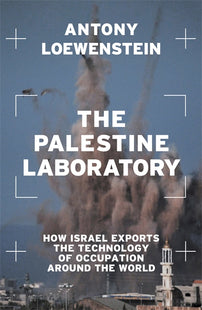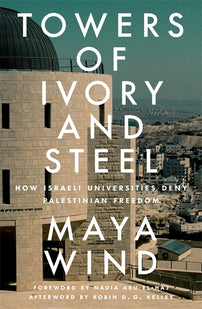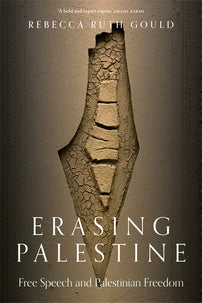Palestine Uncensored: Testimonial 3
Since October 7, pro-Palestine students at universities across the world have faced unprecedented levels of censorship from their institutions, often fueled by their billionaire donors. As part of Verso's Palestine Uncensored series, Francesco Anselmetti details Harvard's policy of censorship and repression.

November 13, 2023
Harvard’s highly predictable, systematic and targeted campaign to punish any expression of solidarity with Palestine during the current war on Gaza began with a surprising blunder. In an otherwise formulaic statement expressing concern for the unfolding ‘situation in the Middle East’ published on October 9, Harvard’s administration made a daring allusion (no more than a vague gesture) to the value of Palestinian lives. Their temerity was met with widespread Zionist outrage. Since then, the university has worked tirelessly to recuperate its credentials as a mouthpiece and laboratory for US empire. Compensating for this initial glitch, this momentary faux pas, Harvard has fallen back in line with the unflinching American consensus that considers Palestinian genocide permissible. This has left faculty and students — overwhelmingly undergraduates of colour —entirely vulnerable to malicious persecution from the American political and media establishment.
It was Harvard’s Palestine Solidarity Committee (PSC), an undergraduate-led campus group, who spoke first after the events of October 7. The statement they issued, which contained arguments of no substantial difference to opinion pieces published in Israeli newspapers that same week, set the scene for the intense backlash that followed. From the former Secretary of the Treasury and ex-Harvard President Larry Summers to billionaire hedge-fund manager Bill Ackman, a whole horde of decorated reactionaries with ties to the university began lobbying for academic, professional and legal sanctions against the statement’s signatories.
It wasn’t long before ‘the truck’ appeared on campus. The PSC’s statement was signed by over 30 student organisations with the explicit aim of shielding individuals from personal repercussions – by now an almost foregone conclusion for pro-Palestine activists at universities in the US and, increasingly, the UK. A number of students nonetheless found their faces and names projected onto three giant LED screens attached to the back of a pick-up truck, owned by a nebulous group named Accuracy in Media. For over two weeks, the truck could be found parked outside the university’s main gates: ‘Harvard’s Leading Antisemites’ read the caption underneath students’ photos. ‘Lists’ and ‘template manuals’ proliferate on malicious online networks of paid and unpaid ‘doxxers’ across the US and Europe, but the Harvard witch-hunt is unique in having a named sponsor. Students’ home addresses and personal details started circulating as the CEO of the company, Adam Guillette, openly admitted to leading the inquisition, and personally visited the university on multiple occasions. Some students began hearing that job offers they had secured had been retracted and, in a few particularly chilling cases, students’ families suddenly found doxxing trucks parked outside their homes.
To date, the university has not even acknowledged the incident publicly nor has it committed to implement concrete measures to protect its students from persecution, despite numerous complaints lodged with the administration. President Claudine Gay has yet to meet with those doxxed, let alone with Palestinian members of the university. The response from Harvard came in a series of pathetic, flaccid communiqués against unspecified instances of ‘harassment’, which in the coalescing climate of anti-Palestinian repression read more as covert threats than assurances. When campus Zionists and their representatives called pro-Palestinian activists ‘less than human’ at their events, the administration responded with yet another diktat announcing the establishment of an ‘anti-semitisim taskforce’. An official warning of sorts, veiled in the language of liberal bureaucracy.
Public recognition of the violent incident and concrete sanction of the actors behind it are hardly a radical demand for an institution which possesses an endowment that equals the GDP of a medium-sized nation state (c. $50 billion). If it wanted to, Harvard could crush the doxxers under the weight of its resources and influence. Instead, students were repeatedly redirected to campus cops and mental health hotlines, apparently the only channels in place for them to voice their grievances. As it happens, the main source of funding for the organisation behind the truck was the Diana Davis Spencer Foundation, a conservative charitable fund headed by the main donor of Harvard’s Center for Russian and Eurasian Studies (the ‘Davis Center’) — the priorities of the richest university in the world, laid bare for all to see.
Students are right to be overwhelmed. It has been sickening to watch their right to free expression and protest be bartered so shamelessly in exchange for the comfort of billionaire donors. The atmosphere of repression that now reigns at Harvard also extends to the classroom. A letter of condemnation for the Palestine Solidarity Committee gathering signatures from more than 200 Harvard faculty members has provoked a profound crisis of confidence in the university’s professorial class. Allies beyond campus — from Butler to Bernie — have also proved fickle, as Congress passes resolutions condemning the ‘antisemitism’ (forever nebulous, never evidenced) of pro-Palestinian marches on student campuses. It remains to be seen with what legitimacy they will enforce this resolution after the country’s largest ever pro-Palestine march in Washington last weekend. For all the pressures they face, students here refuse to be intimidated, even if Brandeis University, just a short drive away from Harvard, became the first university to enact a full ban of its local branch of Students for Justice in Palestine and Columbia University banned its chapters of SJP and Jewish Voice for Peace.
In the first week of the war, vigils to commemorate the dead in Gaza planned by the PSC were blocked from taking place on campus. ‘Security concerns’ were cited by the administration and organisers alike. But Palestinian students and their allies have persevered, and haven’t stood by waiting to be given the space to mourn. They have refused, week after week, to cave into the strictures of campus politics and its capacity to distract from Israel’s crimes in Gaza. Sit-ins have turned into occasions to recenter the countless victims of Israel’s brutal genocide. For now at least, the sound of students reading from the interminable list of martyrs continues to disrupt the smooth operation of quietism and complicity: “al-Astal, Abu Jazar, Hassouna, Nabahin, Abu Shammala…”
Read Testimonial 4 in our Palestine Uncensored series →
[book-strip index="1"]


